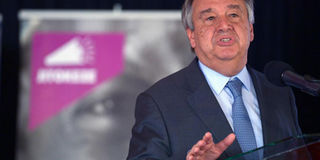Positive African developments worth writing about

United Nations Secretary-General António Guterres in Nairobi on March 8, 2017. PHOTO | TONY KARUMBA | AFP
What you need to know:
- Somalia is an erstwhile basket case that has for a long time been portrayed as a failed state.
- But after the recent change of government in the country, things seem to be looking up for the long-troubled Horn of Africa country.
Given that many African countries are still mired in state of hopelessness, it is good once in a while to have positive developments worth writing about.
A case in point is Somalia, an erstwhile basket case that has for a long time been portrayed as a failed state. But after the recent change of government in the country, things seem to be looking up for the long-troubled Horn of Africa state.
To his credit, new United Nations secretary-general António Guterres landed in the country’s capital Mogadishu last Tuesday on his first field visit to Somalia since he took office in January.
Guterres’ mission in the badly wounded African backland was reportedly to show solidarity with the Somali people, who have recently been embroiled in conflict and insecurity.
Even worse, Somalia is currently staring a serious famine in the face, in addition to threats of disease outbreak. Sadly, the situation has become so dire that about a week ago, the UN appealed for $4.4 billion to respond to the deteriorating situation in the country.
Not surprisingly, the UN boss said the situation was both tragic and regrettable, even as it emerged that the urgent aid being sought for Somalia was intended to avert a catastrophe worse than the famine that claimed 260,000 lives in 2011.
“The combination of drought, conflict and disease outbreak calls for massive support,” the UN chief reportedly said, and after visiting an internally displaced persons’ camp waxed emotional as he added: “With the amount of wealth in the world, it makes me feel extremely unhappy that such scenes are still possible.”
SOUTH SUDAN
But the tragedy is that there are other African countries that are in equally dire straits, among them the seemingly forsaken South Sudan, which has been depicted by Western media as being on the verge of genocide.
After years of being wracked by ethnically inspired political schisms that erupted into devastating serial armed conflicts, the country has in recent times been in disarray following a collapsed peace process.
The political situation became more complex last Monday when a disenchanted former army officer, one Lt. General Thomas Cirilo, threw the spanners into the works by declaring the formation of a new rebel movement.
Styled the National Salvation Front, the movement was according to its leader formed with the prime aim of militarily dislodging current head of state, the embattled President Salva Kiir.
According to Gen Cirilo, his objective was to bring to an end the numerous problems facing the country, which he listed as land grabbing, rampant corruption, tribalism and the general suffering of civilians caught up in the ever worsening national crisis.
Pointedly, the escalating violence in the unusually volatile country has already led to the displacement of an estimated three million people, practically destroyed the agricultural sector and seriously dented the national economy.
Given the dark clouds that have for a long time hovered over the country, it is hardly surprising that its people dedicated last Friday to seeking divine intervention.
After the day was declared a public holiday dedicated to prayers, the South Sudanese people prayed to God to help the country to emerge out of the quagmire that has resulted in almost total national collapse.
ARMED CONFLICT
Also hankering for peace was Mozambique, which has also been steeped in deadly factional conflict pitting the ruling Frelimo government against the rebel Mozambican Resistance Movement (Renamo) led by veteran oppositionist Afonso Dhlakama.
Armed conflict has haunted the country since it gained independence from Portugal in 1975, soon after which it descended into a devastating civil war that lasted more than a decade.
Matters have become worse in recent times, particularly after the ruling Frelimo party, which has been in power since 1975, was again embroiled in deadly skirmishes with Renamo after failure to resolve the post-October 2014 electoral disagreements.
The aftermath was that tens of thousands of Mozambicans have fled across the border into Malawi to escape violence and alleged human rights abuses.
Now there is hope, however tentative, for badly needed national redemption, and as an indication of the prospect of peace about a week ago, Renamo extended a ceasefire by two months to allow further talks with President Filipe Nyusi’s government.
Earlier peace talks had been suspended in October last year, sinking the country once again into an all too common situation of hopelessness amid a deteriorating economic climate in the country.
Hopefully, the serious quest for national healing will eventually spread to other troubled African countries, including the Democratic Republic of Congo and the neighbouring Burundi.





